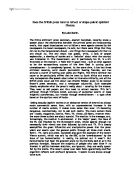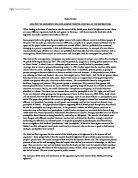Selling sexually explicit stories or an elaborate version of events has always made commercial sense. Now, with an unprecedented increase in the number of media outlets, it makes more sense than ever. It's becoming dangerous, commercially, not to sell such claims. The more outlets there are - books, magazines, comics, films, TV, videos, CD-Roms, Internet sites - the more these outlets are about scandal. The medium is the message, and, increasingly, the medium is adulterated. In the ‘Major’ years, the issue of the EU was hijacked by the Eurosceptic press, whose agenda (though not necessarily their views) was then followed by radio and TV. This clearly exemplifies the great influential and manipulative power that the press yields and exerts upon the general public through all three main media forms – TV, radio and press. Campbell also gave the example of the recent Vienna summit, which was said by the BBC to be ‘overshadowed’ by the issue of tax harmonisation. In reality, he pointed out it wasn’t. But harmonisation had been the greatest scare run by the Daily Mail et al in the previous fortnight. Because the majority of people who take little if no interest in politics between elections, are ignorant, they are easily spoon-fed by the media. The recent uproar over GMO foods (genetically modified organism) reflects such profound ignorance. It seems no one knows enough to be sure.
However Campbell realises there is a double standard. When he accuses the press of being driven by trivia and of an ‘evasion of the real state of Britain’, he knows also that readers are a problem. In truth, the average reader is less interested in politics than they are in say, sport, scandal and horoscopes. Nor is this to be deprecated. As the late Raphael Samuel pointed out in his book, Theatres of Memory, the people’s history tends to be a series of stories, narratives of gory and disastrous happenings, rather than a statistical analysis.
Nevertheless, the alternatives to pure story recreation have been atrophying in recent years. For example, with the Weekend World programme in the early Eighties, there was a corps of specialist newspaper journalists that one could call upon. There were experts on welfare, health, the law, and transport. Campbell is right to stress the importance of encouraging explanation through such specialisms. But he may care to reflect that Labour itself has, for far too long, been ‘riding the back of the tiger’. Much Westminster trivia originates with the politicians, and their minions, themselves. They habitually trot up and down the press corridors, indulging in inane gossip about each other and about the Tories. And it was Tony Banks and Margaret Hodge who really helped to give the anti-Hoddle bandwagon a shove, before the MP’s own remarks on This Morning. Likewise the ‘tough’ spin on the asylum and welfare stories in the last couple of months seems to owe something to desire to grab Mail and Sun headlines.
The Hoddle furore was a classic example of the press attempting to shape public opinion. The-then England manager was purported to have made various allegations about reincarnation with a link to disabilities – these were not technically proven but nevertheless The Sun ran a front page ‘unfounded’ protestation reading something along the lines of ‘Hoddle out!’ sharply followed by the Mirror’s ‘Hod off!.’ In an independent opinion poll study that taken to sample the public reaction (before the headline and after) – the results showed that at first most people felt that the offence was not worthy of one that should be used to sack him from his current position. A significant swing however, was noted after the paper published ‘its view’ with an increase in the number wanting Hoddle ousted from England management. Interestingly enough it was chiefly the ‘anti-Hoddle paper’ readers who tended to alter their stance on the issue. This example once again exemplifies the press patently exerting influence onto a fickle audience. A loyal reader will often deviate from past thinking to accommodate for their paper’s opinion.
The UK press can even stamp their mark on the more important issues such as General Elections. Prior to the polling day of 1997, Tony Blair stated that Britain ‘is not a landslide country.’ Mr Blair may have been warning his supporters against complacency, but was wrong: on Thursday 1 May 1997 Britain was a landslide country, at least in terms of seats won the House of commons. Labour returned to government after eighteen years in opposition with a majority of 179. One of the contributory factors for the Conservatives campaign flopping so disastrously was the abandonment of the Party by many of its former supporters in the press. The issue that agitated the right-wing newspapers was European integration. For instance, The Daily Mail and The Sunday Telegraph became vitriolic critics of the Major Government’s EU policy. The Times even went so far as to refuse to endorse the Conservative Party, calling instead for a vote for Euro-scepticism. This press intervention was prefigured by The Sun claiming, ‘It’s The Sun Wot Won It’ during Labour’s defeat in 1992.
Not only does the media’s intervention produce a second hand version of an event, it also encourages apathy rather than active political participation. The press audience has limited feed back channels, of which usually pass through an editing system with the media professionals acting as ‘gate-keepers.’ As a result these forms of media hardly reflect public opinion. Political events are unlikely to be allotted more than a page in a newspaper. That means that what happened has to be edited down to fit the slot. So, only part of a politician’s speech is given verbatim. The rest of the story or speech is summarised by the journalist. There is little room for, or indeed concern about public opinion. The average tabloid paper operates in a manner similar to the ‘thought police.’ They constantly monitor others for any deviation from prescribed thinking. In Britain we are meant to have a ‘free’ press, one that is not regulated by government or anyone else. One that publishes the truth not inhibits it. The current system is unlikely to change. Many of the papers have an agenda to work to, one created by shadow investors, owners and editors. Even advertisers influence what the press publishes. In the 1980’s, for example, the Sunday Times lost £500,000 worth of advertising from the tobacco company WD & HO Wills because it ran an anti-smoking article. How can papers print a reflection of public opinion in the face of such ‘financial adversity’? As long as such influences, political ignorance, political allegiances and profit-driven capitalist organisations continue to exist, public opinion will remain shaped by two-thirds of Fleet Street, and sway in time to the press.
__________







